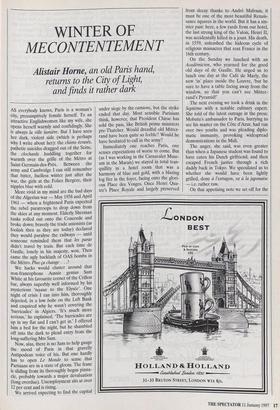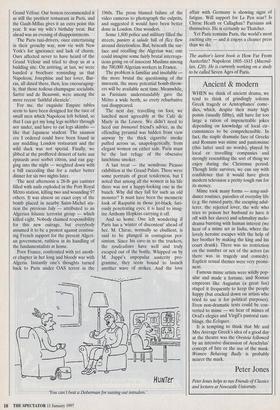WINTER OF MECONTENTEMENT
Alistair Home, an old Paris hand,
returns to the City of Light, and finds it rather dark
AS everybody knows, Paris is a woman's City, presumptively female herself. To an attractive Englishwoman like my wife, she Opens herself warmly and confidingly. She is always kt ville lumiere. But I have seen her dark, violent side (which is perhaps why I write about her): the chiens &rases, pathetic suicides dragged out of the Seine, the clochards huddling together for warmth over the grille of the Metro at Saint-Germain-des-Pres. Between the army and Cambridge I can still remember that bitter, fuelless winter just after the war, the girls at the Folies Bergere, their nipples blue with cold.
More vivid in my mind are the bad days of the Algerian war — May 1958 and April 1961 — when a frightened Paris expected the rebel paratroops to drop down from the skies at any moment. Elderly Sherman tanks rolled out onto the Concorde and broke down; bravely the trade unionists (as foolish then as they are today) declared they would paralyse the railways — until someone reminded them that les paras didn't travel by train. But each time de Gaulle, lonely in his majesty, won. Then came the ugly backlash of OAS bombs in the Metro. Plus ca change . . We hacks would cluster around that non-francophone Aussie genius Sam White at his favourite corner of the Crillon bar, always superbly well informed by his mysterious `tuyaux to the Elysee'. One night of crisis I ran into him, thoroughly dejected, in a low bate on the Left Bank and enquired why he wasn't covering the 'barricades' in Algiers. 'It's much more serious,' he explained. 'The barricades are Up in my flat and I can't get in.' I offered him a bed for the night, but he shambled off into the dark to plead entry from the long-suffering Mrs Sam. Now, alas, there is no Sam to help gauge the mood of Paris in that gravelly Antipodean voice of his. But one hardly has to open Le Monde to sense that Parisians are in a state of gloom. The franc is sliding from its thoroughly bogus pinna- cle, probably towards a major devaluation (long overdue). Unemployment sits at over 12 per cent and is rising. We arrived expecting to find the capital under siege by the camions, but the strike ended that day. Most sensible Parisians think, however, that President Chirac has sold the pass, like British prime ministers pre-Thatcher. Would dreadful old Mitter- rand have been quite so feeble? Would he have hesitated to call in the army?
Immediately one reaches Paris, one senses expectations of worse to come. But (as I was working in the Carnavalet Muse- um in the Marais) we stayed in total tran- quillity in a hotel room that was a harmony of blue and gold, with a blazing log fire in the foyer, facing onto the glori- ous Place des Vosges. Once Henri Qua- tre's Place Royale and largely preserved from decay thanks to Andre Malraux, it must be one of the most beautiful Renais- sance squares in the world. But it has a sin- ister past: here, a few yards from our hotel, the last strong king of the Valois, Henri II, was accidentally killed in a joust. His death, in 1559, unleashed the hideous cycle of religious massacres that rent France in the 16th century.
On the Sunday we lunched with an Academicien, who yearned for the good old days of de Gaulle. He urged us to lunch one day at the Café de Marly, the new 'in' place inside the Louvre, 'but be sure to have a table facing away from the window, so that you can't see Mitter- rand's Pyramid!'
The next evening we took a drink in the Septieme with a notable culinary expert. She told of the latest outrage in the press: Mobutu's ambassador to Paris, hurrying to see his master on the Cote d'Azur, had run over two youths and was pleading diplo- matic immunity, provoking widespread demonstrations in the Midi.
The anger, she said, was even greater than when a Japanese student was found to have eaten his Dutch girlfriend, and then escaped French justice through a rich daddy back in Tokyo. We speculated as to whether she would have been lightly grilled, done et l'estragon, or a la japonaise — i.e. rather raw.
On that appetising note we set off for the Grand Vefour. Our hostess recommended it as still the prettiest restaurant in Paris, and the Gault-Millau gives it an extra point this year. It was my wife's birthday treat. But ahead was an evening of disappointments.
The Paris taxi-drivers, once entertaining in their grouchy way, now vie with New York's for ignorance and lack of charm. Ours affected never to have heard of the Grand Velour and tried to drop us at a building site. On arriving, at last, we were handed a brochure reminding us that Napoleon, Josephine and her lover, Bar- ras, all dined there, then, less encouraging- ly, that those tedious champagne socialists, Sartre and de Beauvoir, were among the more recent 'faithful clientele'.
For me, the exquisite Empire tables seem to have been designed for the race of small men which Napoleon left behind, so that I can get my long legs neither through nor under, and have to eat legs akimbo — like that Japanese student. The saumon cru I ordered could have been found in any middling London restaurant and the wild duck was not special. Finally, we jibbed at the proffered dessert of tarte aux epinards avec sorbet citron, and ran gag- ging into the night — weighted down with a bill exceeding that for a rather better dinner for six two nights later.
The next afternoon a 28-lb gas canister filled with nails exploded in the Port Royal Metro station, killing two and wounding 97 others. It was almost an exact copy of the bomb placed in nearby Saint-Michel sta- tion the previous July — attributed to an Algerian Islamic terrorist group — which killed eight. Nobody claimed responsibility for this new outrage, but everybody assumed it to be a protest against continu- ing French support for the present Algeri- an government, ruthless in its handling of the fundamentalists at home.
Poor France, confronted with yet anoth- er chapter in her long and bloody war with Algeria. Instantly one's thoughts turned back to Paris under OAS terror in the 1960s. The press blamed failure of the video cameras to photograph the culprits, and suggested it would have been better done in London. One wonders.
Some 1,800 police and military filled the streets, paniers a salade full of flies flew around directionless. But, beneath the sur- face and recalling the Algerian war, one could imagine some fairly brutal interroga- tions going on of innocent Muslims among the 700,000 Algerian workers in France.
The problem is familiar and insoluble — the more brutal the questioning of the innocent, the more potential bomb-throw- ers will be available next time. Meanwhile, as Parisians understandably gave the Metro a wide berth, so every rebarbative taxi disappeared.
The next day, travelling on foot, we lunched most agreeably at the Café de Marly in the Louvre. We didn't need to heed our Immortel friend's advice, as the offending pyramid was hidden from view anyway by the thick cigarette smoke puffed across us, unapologetically, from elegant women on either side. Paris must be the last refuge of the obsessive lunchtime smoker.
A last treat — the wondrous Picasso exhibition at the Grand Palais. There were some portraits of great tenderness, but I noted that among all the women in his life there was not a happy-looking one in the bunch. Why did they fall for such an old monster? It must have been the mesmeric look of Rasputin in those jet-black, furi- ously penetrating eyes; it is hard to imag- ine Anthony Hopkins carrying it off.
And so home. One left wondering if Paris has a 'winter of discontent' ahead of her. M. Chirac, normally so ebullient, is said to be plunged in contagious pes- simism. Since his cave-in to the truckers, the syndicalistes have well and truly escaped out of the bottle. Whipped on by M. Juppe's unpopular austerity pro- gramme, they seem bound to launch another wave of strikes. And the love
'You can't beat a Doberman for sussing out intruders.' affair with Germany is showing signs of fatigue. Will support for Le Pen soar? Is Chirac Heath or Callaghan? Parisians ask themselves. He is certainly no Thatcher.
Yet Paris remains Paris, the world's most exciting city — and it enjoys a cleaner press than we do.
The author's latest book is How Far From Austerlitz? Napoleon 1805-1815 (Macmil- lan, £20). He is currently working on a study to be called Seven Ages of Paris.
































 Previous page
Previous page